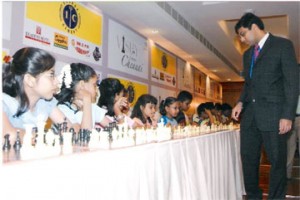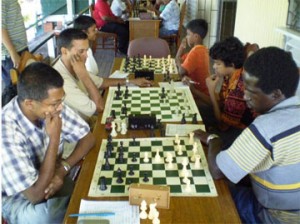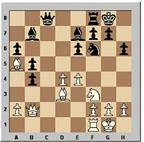Working towards producing a Guyanese grandmaster
‘I prepare myself well. I know what I can do before I go in (to a tournament). I’m always confident’- Bobby Fischer
Can we produce a grandmaster? In the spirit of exuberance and fierce patriotism, I would scream “Yes we can.” But upon serious reflection, can we really produce a grandmaster of chess?
This time I will not scream. Rather, in a more subdued tone, I will say yes. Because I believe it, even with the enormous challenge which such an accomplishment presents.

We do not have grandmasters of chess in the English Caribbean. Cuba has four, Venezuela two, Brazil about four, Costa Rica one, and a number of other countries in Central and South America, nil, nil, nil.
But what is a grandmaster? The title ‘grandmaster’ (GM) is the highest ranking and most prestigious chess title conferred by the World Chess Federation. It is awarded for performance in competition and is held for life. Once you get it you cannot lose it. The term was first used at the great St Petersburg chess tournament of 1914 that was hosted by Nicholas II, Czar of all the Russias. At the banquet concluding the match, the Czar named the top five players ‘Grandmasters of Chess.’ Lasker, Capablanca, Alekhine, Tarrasch and Marshall were the original grandmasters of history.
Before the World Chess Federation began awarding the title to players, the Soviet Chess Federation did so. In 1935 the federation awarded Mikhail Botvinnik the title, and he eventually became the world champion. By 1957, the Soviet Chess Federation had 19 grandmasters, the most from any single country.

The average number of new grandmasters per year increased significantly in the 1980s and 1990s, but exploded in the new millenium. As of January 2008, the World Chess Federation listed 1109 grandmasters with 1002 counted as active. They came from 81 national federations, of which the top five were Russia with 174, Germany 67, Ukraine 64, the USA 61 and Serbia 46. One hundred and sixty-two countries are members of the World Chess Federation, but many of those countries have no grandmasters.
If Guyana produces a grandmaster, its reward in prestige would be great on the world stage. I am of the view it would influence our voice internationally, and generate more respect for us as a nation. Iceland’s
Ambassador to Guyana made a very important point to me about chess in his country when he visited Guyana recently to present his credentials. It was after Olaffson was awarded the title of grandmaster that Iceland became recognized internationally in chess. And after that, in other things as well. He told me something “big” has to happen for your country, and doors will begin to open that were closed before. Such is the enormity of producing a grandmaster.
Regrettably, chess is not a popular game as football or cricket, so it becomes difficult to persuade people to play the game. From last year to now, however, the Guyana Chess Federation has made some progress in encouraging some of our young people to take up the game.
Our foremost challenge is to persuade a sponsor to back a promising kid. A three-year plan would be awesome. A special chess coach would be assigned to that kid. Every day that kid must work with the coach for two hours on chess. Remember, chess and academic work complement each other. Instruction can alternate between face-to-face meetings and through computers which must be available to both parties. The young person should be given an incentive to encourage him or her.
After the first year, there must be the prospect of playing in tournaments in the Caribbean which are FIDE rated. So after the tournament he/she would be awarded an international rating. In three years we can have a FIDE master which is a stepping-stone to becoming a grandmaster. This has to be a very careful and organized plan. Of course the prospect would be carefully chosen. When this happens, Guyana would be on its way to producing its first grandmaster and become the envy of many countries in the world. What a day that would be!
Sponsorship of a youngster who has demonstrated talent above others is necessary. And then, and only then, would we begin our journey towards having a Guyanese grandmaster of chess!
Topalov v Carlsen
 The super-grandmaster double round robin tournament is currently taking place in Bilbao, Spain. The six-player tournament has been called one of the strongest in the history of the game, with an average rating of 2775, making it a staggering Category 22 event. In the following game, Bulgaria’s Veselin Topalov defeats Norway’s wonder boy of chess, Magnus Carlsen.
The super-grandmaster double round robin tournament is currently taking place in Bilbao, Spain. The six-player tournament has been called one of the strongest in the history of the game, with an average rating of 2775, making it a staggering Category 22 event. In the following game, Bulgaria’s Veselin Topalov defeats Norway’s wonder boy of chess, Magnus Carlsen.
Carlsen, M (2775) – Topalov, V (2777)
Grand Slam Final Bilbao ESP (3), 4.9.2008
1.d4 Nf6 2.c4 e6 3.Nf3 d5 4.Nc3 Be7 5.Bg5 h6 6.Bh4 0-0 7.e3 b6 8.Bd3 Bb7 9.0-0 Nbd7 10.Bg3 c5 11.cxd5 Nxd5 12.Nxd5 Bxd5 13.e4 Bb7 14.Rc1 a6 15.b4 cxb4 16.Bc7 Qe8 17.Qe2 b5 18.Ba5 Rc8 19.Qb2 Nf6 20.Rxc8 Qxc8
21.Nd2? Qc3 22.Qxc3 bxc3 23.Bxc3 Rc8 24.Ba5 Bd8 25.Bxd8 Rxd8 26.Rd1. Everything forced, and White has a pawn less. 26…Rxd4 27.Nb3 Rd8 28.f3 Kf8 29.Kf2 Nd7 30.Be2 Ke7 31.Na5 Ba8 32.Rc1 Kd6 33.Ke3 Nb6 34.f4 Rc8 35.Rxc8 Nxc8 36.Kd4 Ne7 37.Bf3 Kc7 38.Nb3 Kb6 39.Ke5 Ng6+ 40.Kd6 Nxf4. Now he’s two pawns down. 41.Nc5 b4 42.h4 a5 43.g3. Things are going from bad to worse. Nobody and nothing can hold this position against Topalov. 43…Nh3 44.Nd7+ Ka7 45.Kc5 f5 46.Kb5 fxe4 47.Bh5 e3 48.Kxa5 g6 49.Bg4 h5 50.Be2 Ng1 51.Bf1 e2 52.Bxe2 Nxe2 53.Nf8 Be4 54.Nxe6 Nxg3 55.Nf4 Kb7 56.Kxb4 Kc6 0-1.
